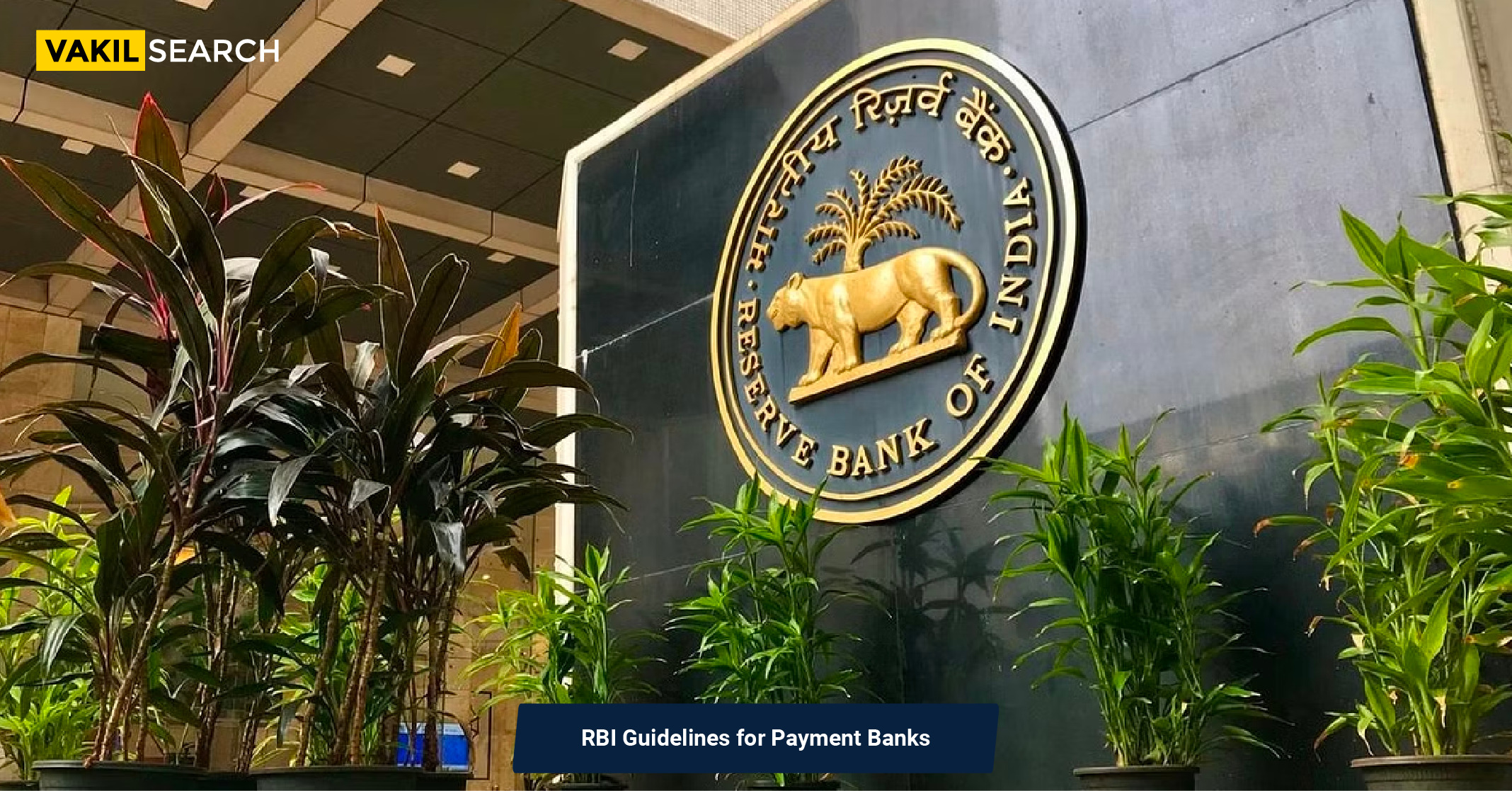Discover RBI's guidelines for Payment Banks, covering services, restrictions, and compliance requirements. Learn how Vakilsearch aids Payment Banks in regulatory compliance.
The Reserve Bank of India (RBI) plays a pivotal role in shaping the landscape of financial services in the country. One of its important initiatives is the establishment of Payment Banks, aimed at promoting financial inclusion and providing basic banking services to the unbanked and underbanked population. RBI has laid down specific guidelines to regulate and guide the operations of Payment Banks. This article delves into the details of these guidelines, focusing on the scope of services, operational restrictions, and compliance requirements that payment banks need to adhere to.
Introduction to Payment Banks
Payment Banks, as per RBI guidelines, are a new category of banks conceptualised to provide efficient banking services to small businesses and low-income households. These banks focus on facilitating financial transactions, including receiving deposits and making payments, but do not undertake lending activities like traditional banks. The intent is to leverage technology and digital platforms to ensure the broad reach of banking services, especially in rural and remote areas.
Scope of Services
Acceptance of Deposits
Payment Banks are allowed to accept deposits from individuals and small businesses, up to a prescribed limit per customer. These deposits serve as a secure avenue for customers to store their money and earn interest.
Payments and Remittances
Payment Banks facilitate transactions such as remittances, utility bill payments, and other payments using digital channels. They offer a seamless platform for customers to conduct their financial transactions efficiently.
Prepaid Instruments
Payment Banks can issue prepaid payment instruments like prepaid wallets, mobile wallets, and prepaid cards, enabling easy transactions and payments without the need for a traditional bank account.
Internet Banking
RBI guidelines permit Payment Banks to provide internet banking services to their customers, enhancing accessibility and convenience for account holders to manage their finances online.
Other Services
Apart from the aforementioned services, Payment Banks can offer other non-risk-bearing financial products such as mutual funds, insurance, and pension products in partnership with other financial institutions.
Operational Restrictions
No Lending Activities
One of the primary operational restrictions imposed on Payment Banks is that they are prohibited from engaging in any form of lending activities. Unlike traditional banks, they cannot issue loans or credit to customers.
Deposit Limit
RBI has set a cap on the maximum deposit amount that a customer can hold in a Payment Bank. This measure ensures that the bank focuses on providing basic banking services and does not accumulate excess funds beyond the specified limit.
Investment Restrictions
Payment Banks are subject to restrictions regarding where they can invest their funds. They need to follow guidelines set by the RBI to maintain the safety and liquidity of their investments.
Compliance Requirements
Know Your Customer (KYC) Compliance
Payment Banks must strictly adhere to KYC norms when onboarding customers. This involves comprehensive verification of customer identities to mitigate the risks associated with money laundering and fraudulent activities.
Anti-Money Laundering (AML) Compliance
Payment Banks need to implement robust AML measures to prevent money laundering and financing of illegal activities. Regular monitoring and reporting of suspicious transactions are key aspects of AML compliance.
Risk Management and Cybersecurity
RBI mandates Payment Banks to establish a robust risk management framework and cybersecurity measures to protect customer data and ensure the security of transactions. This includes regular audits and security assessments.
Reporting and Audit
Payment Banks are required to submit periodic reports to RBI regarding their operations, financials, and compliance with regulatory guidelines. Additionally, they are subject to regular audits to ensure adherence to the prescribed norms.
Competition and Collaborations
Competitive Landscape
RBI encourages healthy competition among Payment Banks, promoting innovation and improved services. Payment Banks need to strategise and differentiate themselves in a crowded market to gain a competitive edge.
Collaborations and Partnerships
Payment Banks have the option to collaborate with other financial institutions, fintech companies, or government agencies to enhance their service offerings, expand customer base, and diversify revenue streams.
Technology Infrastructure and Security
Robust Technology Infrastructure
Payment Banks are required to maintain a resilient technology infrastructure to ensure seamless operations, especially in a digital environment. This involves investing in state-of-the-art systems and networks.
Data Privacy and Security
RBI emphasises the importance of safeguarding customer data and privacy. Payment Banks must adhere to stringent data security measures and comply with applicable laws and regulations.
Financial Literacy and Education
Promoting Financial Literacy
Payment Banks are encouraged to play an active role in educating customers, particularly in rural and underprivileged areas, about financial products, services, and responsible financial behaviour.
Awareness Campaigns
Payment Banks can organise awareness campaigns to inform people about the benefits of banking services, digital transactions, and the importance of savings and investments.
Conclusion
RBI’s guidelines for Payment Banks are designed to strike a balance between promoting financial inclusion and maintaining a secure and stable financial system. By outlining the scope of services, operational restrictions, and compliance requirements, RBI ensures that Payment Banks contribute effectively to the financial ecosystem while safeguarding the interests of customers and the integrity of the banking industry. It is imperative for Payment Banks to meticulously adhere to these guidelines to thrive in the competitive landscape and foster trust among their customer base.
In achieving compliance with these regulations and maintaining the highest standards of operation, Vakilsearch, as a leading legal and compliance solutions provider, plays a crucial role. Our expertise and guidance support Payment Banks in navigating the regulatory landscape effectively. Vakilsearch aids in ensuring that Payment Banks meet the required standards, fostering a foundation of trust and credibility within the financial sector. This collaborative effort significantly amplifies the impact of Payment Banks, ultimately contributing to a more inclusive and robust banking system in India.



